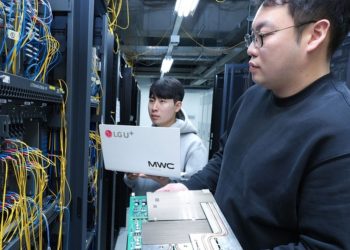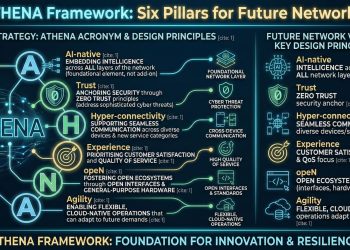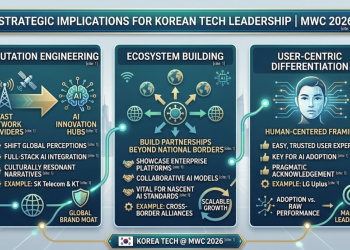As AI continues to permeate various sectors, the emerging concept of “super-giant AI” has gained considerable momentum. Hence, we witness South Korea propelling itself into Generative AI with a committed focus on global prominence.
While the spotlight shines brightly on AI developments worldwide, Korean tech giants are not behind in this transformative wave. Their endeavors, which span diverse sectors, are set to redefine the AI landscape. From home appliances to gen language models, these projects represent more than technological advancements; they are key contributions to the ongoing dialogue of Gen AI.
Join us to explore the top 6 Gen AI projects from South Korean tech giants in 2023, illuminating their innovative pursuits, strategic goals, and the global impact of their endeavors.
KT’s Mi:dm AI Model – Unleashing Korea’s AI Potential:

South Korea’s mobile carrier, KT Corp., recently introduced its AI model named “Mi:dm.” This project is strategically designed to grow AI applications across a spectrum of sectors, extending its influence not only within South Korea but also onto the global stage.
Mi:dm represents the first large-scale language model (LLM) developed by a Korean company, with a colossal dataset comprising over 1 trillion tokens, the fundamental building blocks for text-based LLMs.
Main Goals and Objectives of Mi:dm
- Facilitate the proliferation of artificial intelligence across various sectors, including manufacturing, finance, education, and the public domain in South Korea.
- Foster the development of high-quality AI solutions and services, both within South Korea and in the global market.
- Strengthen KT Corp.’s information and communication technology (ICT) business by creating innovative application services in collaboration with external partners.
- Aim for significant growth and anticipate sales of 100 billion won within the next three years.
Significance in the AI Landscape:
- Distinguishes South Korea with its development of a large-scale language model (LLM).
- Mi:dm’s parameter-rich models set a benchmark, exceeding the capabilities of renowned global models.
- Shapes the future of AI applications across diverse industries, reinforcing South Korea’s global AI influence.
Samsung’s Generative AI for Home Appliances in 2024

Samsung Electronics recently incorporated generative artificial intelligence (AI) features in its home appliances product line set for release in 2024. This initiative aims to create home appliances with enhanced user interactions driven by intuitive generative AI capabilities. Key to this project is integrating an ultra-low-power Neural Processing Unit (NPU) chipset to optimize AI functionality, enhancing user-friendliness.
Main Goals and Objectives:
- Empower home appliances with generative AI features to create more intuitive user interactions in South Korea.
- Implement ultra-low-power Neural Processing Unit (NPU) chipsets to enable efficient generative AI operations.
- Expand the scope of generative AI across voice recognition, visual processing, and display functionalities.
- Develop context-aware and intelligent home appliances capable of understanding user behavior and preferences for personalized interactions.
Significance in the AI Landscape:
- Positions Samsung Electronics as a pioneer in AI integration within home appliances.
- Expands generative AI applications to voice, vision, and display functionalities, catering to diverse user needs.
- It aims to deliver context-aware and intelligent home appliances for a more conversational and personalized user experience.
- Addresses the challenge of high power consumption in AI operations by introducing ultra-low-power NPU chipsets.
HyperCLOVA X’s “Cue:” – The Interactive AI Search Engine

Naver’s HyperCLOVA X Corp. recently launched a beta version of its generative AI search engine, “Cue:“, officially entering the competitive global generative AI arena. This new search engine uses the power of Naver’s extensive language model, HyperCLOVA X, which was unveiled in August 2023.
Main Goals and Objectives:
- Introduce a unique approach to information retrieval by offering an interactive chat-based search engine.
- Challenge established search engine giants like Microsoft’s Bing and compete in AI-driven innovations.
- Improve the search experience by allowing users to pose questions conversationally, enhancing the intuitiveness and efficiency of search results.
- Implement “multistep” reasoning technology to provide credible and logical answers, especially for complex queries.
Significance in the AI Landscape:
- Cue: signifies Naver’s determination to innovate and compete in the AI sector.
- It departs from traditional search engine models, introducing a more conversational and interactive way of accessing information.
- The platform plans to refine and expand its capabilities during the trial period and integrate it into Naver’s integrated search engine beginning in November 2023.
- Currently, Cue: is accessible in a closed-beta version on PC to users with a Naver ID.
Samsung’s Exclusive In-House Generative AI Model

Samsung developed an exclusive platform akin to OpenAI’s ChatGPT and Google’s Bard. To ensure the protection of sensitive information, Samsung is collaborating with Naver to create a generative AI model similar to ChatGPT. Unlike its counterparts aiming for public availability, Samsung is concentrating on crafting an in-house generative AI solution exclusively accessible to its employees.
Main Goals and Objectives:
- Develop an in-house generative AI solution for Samsung employees to prevent inadvertent leaks of confidential company information.
- Address the challenges stemming from the popularity and ubiquity of generative AI platforms like ChatGPT.
- Tailor the new platform’s capabilities to meet the specific needs of Samsung’s workforce.
- Create a controlled AI environment to mitigate the risk of unauthorized disclosures of sensitive information within the company.
Significance in the AI Landscape:
- Samsung’s approach highlights the critical need for protecting sensitive company information in the age of widespread generative AI.
- By partnering with Naver, Samsung seeks to develop a controlled and internal AI environment to safeguard confidential data.
- While the exact capabilities of the platform are undisclosed, it is expected to be an exclusive tool for Samsung’s Device Solutions Division initially, with the potential for expansion to other divisions in the future.
LG CNS Introduces DAP GenAI for Enterprise Efficiency

LG CNS has unveiled DAP GenAI, an enterprise-focused generative artificial intelligence (AI) platform to enhance work efficiency within secure environments. This service empowers businesses to seamlessly integrate DAP GenAI into their existing infrastructure, offering a customizable solution tailored to their specific needs.
DAP GenAI comprises three integral modules: AI Service, AI Prompt, and LLMOps, collectively contributing to the broader adoption of language AI solutions within enterprises. The platform’s unique feature is its operation exclusively within a company’s internal information assets, safeguarding against AI hallucinations that may produce misleading or distorted content.
Main Goals and Objectives:
- Provide enterprise customers with a secure and versatile generative AI platform.
- Enable integration with a company’s existing infrastructure, including servers and cloud.
- Offer access to four prominent large language models, including OpenAI’s ChatGPT, to facilitate diverse AI services.
- Support various applications, from document summarization and classification to advanced tasks like product recommendations and data-driven report generation.
Significance in the AI Landscape:
- DAP GenAI caters to the specific needs of enterprise customers, focusing on work efficiency and security.
- It mitigates the risk of AI-generated misinformation and distortion by operating within a closed ecosystem.
- By providing accessibility to prominent large language models, it empowers businesses with versatile AI capabilities, expanding the range of AI services that can be deployed within an organization’s framework.
SK Telecom and Deutsche Telekom – Advancing Telecom AI

SK Telecom, a prominent South Korean telecommunications provider, has entered a strategic partnership with Deutsche Telekom, a global telecom company. Their collaborative effort is centered around the joint development of a Large Language Model (LLM) specifically tailored for the telecommunications industry. The primary focus of this initiative is to advance artificial intelligence (AI) capabilities within the sector.
Main Goals and Objectives:
- The development of a specialized multilingual LLM that caters to the telecommunications field, supporting languages such as Korean, German, and English.
- Collaborations with AI firms, including Anthropic PBC and Meta Platforms Inc., to harness their expertise.
- A Letter of Intent (LOI) was signed to create this specialized LLM, with the aim of enabling global telecommunication companies (telcos) to efficiently and swiftly develop generative AI models.
Significance in the AI Landscape:
- This partnership is particularly important for SK Telecom, given its initiation of the Global Telco AI Alliance, which unites major telecom giants in a shared objective.
- The tailored LLM holds the potential to revolutionize AI-driven call centers and customer service functions.
- Key executives from SK Telecom and Deutsche Telekom, including CEOs and Chief Officers, participated in this significant collaboration, highlighting the gravity of the endeavor.
South Korean tech giants are stepping into the spotlight with some of the pivotal Gen AI projects. From large-scale language models to generative AI in home appliances and secure enterprise solutions, they are actively shaping the future of artificial intelligence. These top 5 Gen AI projects exemplify not only technological advancements but also strategic contributions to the ongoing dialogue of Gen AI.
Also read:
- President Yoon Urges Big Investments in Super-Giant AI
- Samsung Research President Outlines AI Vision for Samsung
- Naver and Kakao Quicken Entry into Business AI Market
- Korea Establishes First National Standard for AI Ethics in Response to Generative AI Technology
- Samsung Electronics temporarily bans ChatGPT and other generative AI tools for employees







